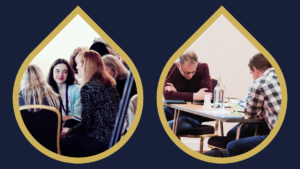
Contrary to everyone’s reassurances, David’s grief only seemed to deepen. People said he just needed time – slowly, they said, his sadness would fade and he’d get over it. Only, David didn’t want to ‘get over it’. He wasn’t sure he understood what the phrase even meant. How does anyone ‘get over’ the loss of someone who was closer to him than anyone else on earth? He was bereaved – and bereft – and it felt to him as if he might stay that way forever.
Most of us will face the aching emptiness of loss at some point in our lives. Sadly, we may also face the empty platitudes with which loss is so often met. ‘Time will heal’, ‘try to keep active’, and, of course, ‘you’ll get over it’.
Christians have extra platitudes of their own. ‘He is sovereign’, ‘she’s in a better place’, ‘he works for the good’, ‘his plans are always perfect’. It’s not, of course, that these platitudes are false – God is sovereign and he does work for the good and, if David’s beloved died a believer, she really is in a better place.
The problem with platitudes is less about truth as it is about timing. True things, spoken at the right time, can bring untold comfort and grace. But true things, spoken at the wrong time, can ‘pierce like a sword’ (see Proverbs 12:18).
Loss is so very common – alongside devastating losses like David’s are countless other forms of loss. Some take the shape of disappointment – a relationship that didn’t work out; a career that stalled; a pregnancy that never arrived. Other losses creep into the territory of regret – a decision that backfired or an error of judgment whose impact still lingers. Other losses include the loss of faculties with dementia; the loss of trust in betrayal; the loss of home for a refugee. Sometimes our losses are specifically spiritual like the loss of faith or the loss of hope.
Those living in the materially rich West with its long life expectancy often aren’t very well prepared for loss. We are used to having, not losing. Which means losses often catch us unaware and knock us off balance.
Responding well to the experience of loss will be the focus of this year’s national conference in March. We will, of course, be considering how hope in Christ transforms an experience of loss. But before speaking, we must listen. Those offering comfort must first attend to the experience of loss. That’s where timing comes in.
Speaking before listening invariably means our words fall flat. For every loss is different. There isn’t a ‘one size fits all’, ‘off the shelf’ response to loss that can be rolled out in all circumstances. Until we have heard the particular way in which this loss has impacted this person, we aren’t ready to speak.
One important aspect of our conference, therefore, will be that we won’t just talk about the experience of loss but that we will have input from people who have suffered loss and are willing to describe their experience to us.
As usual our conference will conclude with an additional 24-hour workshop where a smaller number of delegates will think together about how churches can respond in those occasions where despair and even suicide become a reality for our church families.
Loss has so many dimensions and comes in so many forms. This conference, obviously, will only scratch the surface. But we trust that, as in previous years, doing some thinking together will help all of our churches to hold out the riches of Christ more lovingly in the face of the many struggles of life that surround us. I hope you might be able to join us – either in person or online.